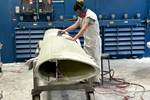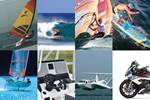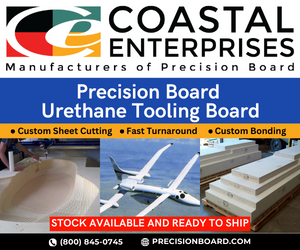CompositesWorld reveals 2024 Top Shops benchmarking survey results
CW recognizes the qualifying composites fabricators in its 2024 Top Shops program and highlights some of the survey's general findings.

Participating shops reported 80-85% of orders including material specifications in the 2024 report, up from 75-78% in 2020. Source (All images) | Gardner Intelligence
Every year, CompositesWorld, in collaboration with Gardner Intelligence, the research division of Gardner Business Media (Cincinnati, Ohio, U.S.), invites composites fabricators worldwide to participate in the CW Top Shops benchmarking program. Top Shops is a survey-based a program designed to help composites fabricators identify optimal practices, and improve business operations and procedures. Resulting reports offer a data-driven analysis of each participating facility’s performance based on numerous key operating metrics to help participants assess their performance in comparison to other surveyed facilities. High-performing facilities across these metrics earn the prestigious distinction of qualifying as a CW Top Shop.
This year’s qualifying facilities are as follows:
- ATC Manufacturing (Post Falls, Idaho, U.S.)
- B&T Composites (Florina, Greece)
- Bucci Composites S.p.A. (Faenza, Italy)
- Calian Composites Ltd. (Saskatoon, Canada)
- Champion Fiberglass (Spring, Texas, U.S.)
- Compotech Inc. (Brewer, Maine, U.S.)
- EPP Composites Pvt Ltd. (Rajkot, India)
- Nammo Composite Solutions LLC (Salt Lake City, Utah, U.S.)
- Polymore Materials (Singapore)
- Rock West Composites (San Diego, Calif., U.S.)
- Seekins precision inc. (Lewiston, Idaho, U.S.)
- Spintech Inc. (Miamisburg, Ohio, U.S.)
Convergence in Material Specifications
In terms of overall findings, the latest CW Top Shops Benchmarking Survey for the composites industry indicates a convergence between Top Shops and other shops participating in the survey in several key performance metrics that suggest increasing customer pressure and control within the industry.

Higher average lead times could be driven by increasingly stringent material requirements.
Over the past 3 years, a higher percentage of qualifying Top Shops received orders with material specifications compared to other shops. This trend has now converged, with both segments reporting 80-85% of orders including material specifications in the 2024 report, up from 75-78% in 2020. This shift may indicate growing customer influence, as companies strive to meet increasingly stringent material requirements set by their clients.
The survey also highlights a potential link between the increased incidence of material specifications and higher average lead times. This trend could be driven by the additional time required to source and verify specified materials, leading to longer production cycles.

Composites fabricators participating in the Top Shops benchmarking survey reported declines in capital expenditure (CapEx) in 2024.
All shops participating in the survey reported declines in capital expenditure (CapEx) for the year, with non-qualifying shops experiencing a notable decrease from an unusually high level of spending last year. This return to more typical spending patterns may reflect a stabilization in investment strategies, with Top Shops once again outspending other shops on CapEx. While this observation alone does not provide a comprehensive story, it aligns with the broader trend of convergence and standardization within the industry.
Related Content
-
Recycling end-of-life composite parts: New methods, markets
From infrastructure solutions to consumer products, Polish recycler Anmet and Netherlands-based researchers are developing new methods for repurposing wind turbine blades and other composite parts.
-
Bioabsorbable and degradable glass fibers, compostable composite parts
ABM Composite offers sustainable options and up to a 60% reduction in carbon footprint for glass fiber-reinforced composites.
-
Dawn Aerospace reusable rocket-powered aircraft flies twice in one day
Eighth and ninth flights of composites-intensive Mk-II Aurora reach an altitude of 63,000 feet, demonstrates same-day reusability capability for rocket-powered systems.
















